PORTLAND, OREGON EXCAVATING CONTRACTORS
GET TO KNOW US
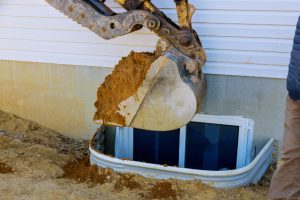
Excavation is a vital aspect of any construction endeavor. Different kinds of excavations are used in different construction projects. Our excavating contractors are experienced and can explain to you the kind of excavation required depends mainly on the purpose and the material.
These days, the most popular forms include rock and topsoil excavation, basement excavation, concrete crushing and recycling, and underground hydro excavation.
There are three types of excavation, wet mound, dry bottom, and wet, trenched excavation. In wet mound excavation, a thick layer of soil is removed and compacted. In dry bottom excavation, the earth is excavated and then leveled.
This kind of earth excavation can be more time-consuming than wet mound excavation. And in wet trench excavation, the soil is excavated at a depth of up to 6 inches and the area excavated is much larger than that of a single crawlspace.
Another commonly used form of earth excavation is known as ballast excavation. In this method, a trench is dug around the construction area. The soil is then packed tightly and topped with compacted earth.
This is one of the easiest excavation methods and can be carried out quickly if the area to be excavated is small.

FILL IN YOUR DETAILS BELOW FOR YOUR FREE EXCAVATION ESTIMATE!
EXCAVATION SERVICES IN PORTLAND, OR
Our Portland excavation services company works with some of the best excavators in the industry. Some of the work we do such as in rock excavation, the hole is dug around the construction area using a drill and then a rock is chipped away. This type of excavation is also known as topsoil excavation. Trench Excavation is a kind of rock excavation that uses a large-sized hole and then a layer of compacted earth is thrown over the hole.
This layer is made to measure about four feet in depth. This type of excavation is used for mining places that produce bulk materials like sand, gravel, metal, and so on.
This is one of the most effective methods of removing soil, gravel, and rocks from the site without having to disturb the land. This makes it one of the most preferred types of excavation used today. When topsoil excavation is conducted, the work should be done only by one of our trained Portland Oregon excavating contractors. If this is not done, the work can damage the ground and even cause a major disaster.
Caterpillar excavators are one of the most commonly used types of excavation equipment used today. These excavators are made to move soil in a short period of time. They are very helpful for contractors who have to relocate certain areas of land on a regular basis. This type of excavator makes things a lot faster and easier for them to perform the task.
Excavation
Excavation is an important part of any construction project. We use different tools and techniques to move soil, rock, and other material to prepare the area for construction.
Demolition
Demolitions are complex and require close examination before taking them on. They might be necessary for reasons such as a faulty foundation, redevelopment, or a health hazard.
Dump Truck Service
Whether you have a one-off project or many more, the quicker you can clean up the better. Hiring a dump truck service helps with large cleanups that you may not want to take on.
Concrete Crushing and Recycling
Recycling concrete helps reduce construction waste and extend the life of landfills. It helps save builders’ disposal or tipping fees. It helps reduce transportation costs because concrete can often be recycled in areas near the demolition or construction site.
Underground Hydro
Underground utilities are needed most of the time for construction. Excavation to lay these utilities carries many risks. The existence of underground hydro excavation considerably lessens these risks and it can be used for several excavation applications.
EXCAVATION
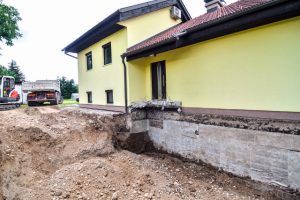
Excavation is the process of removing material from a work area for the foundation, basement, or other structural purposes. The amount of material removed and the method used will depend on many factors including the size of the job and the amount of land available. The duration of excavation and how long it takes to excavate a specific job site can range from 3 days to up to 3 weeks, and at times a few months.
This time span can also be determined by the type of foundation or construction, as well as any constraints existing surrounding the work, such as height, traffic, electrical, lighting, and distance to power lines and utility lines.
In addition to the actual excavation process itself, other critical components need to be coordinated well in advance of the commencement of work. Most importantly, all necessary legal permits must be obtained and implemented. Obtaining these will ensure that our excavator is able to dig at designated locations with safety and protection from environmental concerns in mind.
Permits are obtained from the local government in accordance with applicable municipal codes. Once obtained, our local contractor will oversee the processing and clearing of soil for the installation of footers, footings, retaining walls, and any other necessary components.
The actual excavation process begins a few days before the actual work begins. The first step is the site survey which will inform the contractor of all potential surface and groundwater problems. After the preliminary survey has been completed, the actual excavation work begins. Our excavators are equipped with the necessary equipment and are directed by one of our experienced professionals to clear the site of all debris and built-up soil so that the foundation can be prepared for foundation footings and other features.
Depending on the size and shape of the project, excavation may last from one day to two weeks. Excavating for a commercial project requires more planning than a residential project, and depending on the utility considerations, longer periods of time may be required. The length of time excavating will take also depends on the type of features being constructed, as well as on the amount of dirt and debris that need to be moved.
Once the land is cleared, the next step in the excavation process and how long it takes to complete it is grading. This will determine the direction of the slope of the land, as well as whether the area will be flat or inclined. It is important to make certain all features match up correctly before beginning any digging. Grading will also take place during the excavation process and can prevent mud from entering through drains or underneath the ground.
The rate at which the soil will move is another factor in determining how long the excavation will take. When it comes to soil movement, there are two types: slow and fast. As the name suggests, slow soil movement takes longer to move. On the other hand, fast-soil movement happens very quickly.
If the site is being excavated near a road or other such feature, slow movement is acceptable, but when excavating near a body of water, a fast-soil movement is more preferred. Another important factor to consider is how thick clay in the soil is, as this will affect the ease with which a tiller can be used.
The last stage in the excavation process and how long it takes to excavate involve the breaking of the ground. This is often done using a bulldozer or a grader and can take several hours to complete depending on the size of the excavation. If the soil is difficult to break, it may require more than one machine.
When the soil is broken, the remaining portion will need to be compacted. This can take a number of days and will depend largely on the quality of the soil, the thickness, and other factors.
Excavation can be a very complex process, but understanding the steps is vital to making the job go smoothly. The contractors we work with have a well-designed plan of action that outlines how the project should go from start to finish. Once all of the pieces of the puzzle start to fit together, the excavation process and how long it takes to excavate can be streamlined.
CALL THE BEST PORTLAND EXCAVATION CONTRACTORS TODAY!
IMPORTANT EXCAVATION STATS
The contractors we work with have years of experience in the industry and continue to sharpen their skills with every project completion.
There are 39,961 Excavation Contractors businesses in the US as of 2021.
We ensure to privode everyone with excellent service!

Demolition and construction mean different things to different people. To some, the destruction of a home or property means that it must be torn down and rebuilt from scratch. To others, it is simply the removal of a structure and the construction of another.
For the majority of Americans, however, demolition means building anew, and that the second structure is usually one that is built on a foundation already in place. This is especially true in homes built along what is known as a “green belt” around scenic natural areas. In these homes, the original homes were torn down years ago and new homes are placed where the old homes once stood.
As the population continues to grow in cities across America, developers will continue to tear down older homes and replace them with newer, high-rise structures. Sometimes this means tearing down trees that have grown too large to handle, or tearing down a structure that poses an environmental hazard. Developers sometimes feel that it is more economical to demolish a structure rather than restore it.
This is not always the best idea, as many times when the homes are torn down, they do not leave behind a significant amount of land for reuse. In addition, in many cases, torn-down homes and buildings do not provide access to the public sewer system or an adequate water supply to keep the property livable.
There are many pros and cons associated with both demolition and excavation. The amount of money and time needed for demolition varies greatly, depending upon the type of building and whether it is a one-story or two-story. Also, the safety and environmental effects of tearing down a building must be weighed against creating an open space within the planned area.
Many homeowners prefer the appeal of a newly constructed home to that of an older one that needs work and maintenance, but developers may prefer the removal of existing homes and the ability to sell the site for more convenience.
Demolition is quick, easy, and allows the developer to gain instant equity once the demolition is completed. In contrast, it can take weeks, months, for a foundation and wall to be built, while new homes may only require minor adjustments or cosmetic changes. Additionally, many homebuyers prefer to see a home for themselves before making any purchases.
By removing the existing structure, the developer can also improve the aesthetic appearance of the property. This can be achieved by performing upgrades on landscaping among other things.
WE TAKE PRIDE IN OUR EXCELLENT CUSTOMER SERVICE & COMPETITIVE PRICING!
DUMP TRUCK SERVICE
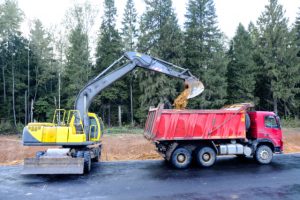
If you need dump truck services then you are certainly in luck. One of the things our Portland Excavation company specializes in is dump truck service and hauling various kinds of materials. We are more than happy to help you get the job done right.
From picking up large quantities of topsoil to breaking down the concrete, you can find just about any service you need with our dump truck services. Here are some options for the types of services you can get from our haul away concrete company.
We are going to start with the most common kind of dump truck services we offer. They include the more generic kinds of hauling such as towing large loads of topsoil and breaking down concrete. You might think that these jobs would require back-breaking heavy equipment, but in fact, dump trucks are usually equipped with backup batteries so that they can be used without having to use manpower. Other kinds of equipment that may be needed are skid steers and pick-up trucks.
Some other options include grading your soil, excavating areas to build a driveway, or grading roads. We can also help you with moving materials. Depending on the size and type of load, our contractors will come to your house or place of business with a truck and trailer to move your materials. You can usually schedule this kind of work for a certain date in advance and have the items moved on the same day.
We can also haul materials for demolition jobs around town. We can also haul away excavation construction materials for people or a company that needs to work on a property for remodeling, such as steel framing. This can help them get things under control faster so that they can begin to work on what they need to. It can be helpful so that they don’t become overwhelmed with all of the materials. You can call our professionals to find out more about what kind of services we have available.
There are many other services that we can provide for our customers. If you have an industrial building, we can take care of a lot of the work for you when you hire our dump truck service to do it all for you. If you own a small lawn care business, we can often help with jobs around the neighborhood. If you have any questions, you can always speak to one of our customer representatives to see what kind of dump truck services we can provide for you.
CONCRETE CRUSHING AND RECYCLING
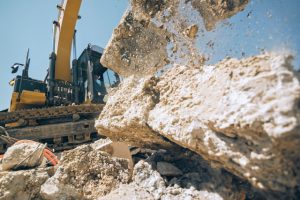
When it comes to what kinds of projects can be accomplished with recycled concrete, the possibilities are endless. There are so many ways in which this product can be used that there is no limit as to how much can be accomplished.
For instance, you can use it in your new homes as a great landscaping improvement or for pathways on the outside of your homes. You can pave walkways, paths, and driveways with it and then use it to create great drainage options to keep water from collecting on the walkways and making them dry out and fall apart. In fact, if you have ever walked on a cracked and wet path with large puddles of water in the cracks then you will know how frustrating this can be.
Pathways are something that can really benefit from crushed concrete. In fact, in the United States, there are designated paths that are made for walking and designated retaining walls that are made for use as retaining walls. Pathways make it easier for people to move from one place to another. Retaining walls are used in areas where water is an issue because they can help keep water away from certain areas while protecting the soil underneath. Either of these methods can be applied to a path or to a retaining wall.
When it comes to patios and decks, this product can be used in so many different ways. Patios can be made with concreted sand or you can put it in by hand to create a level surface. Decking can be done in a variety of ways including building the deck from scratch or using precast or poured concrete.
In either case, the project will involve a lot of measuring and work with large tools. However, once the project is underway and the concrete is poured, there is usually no stopping any further until the project is finished.
Pathways can be used as walkways or they can be used as stepping stones or to create gardens. Pathways can also be used as stepping stones or to line a garden. If you have a large garden area, this product can be used as a decorative feature. It can also be used as a path to help a person to walk from one garden to another.
If you want to know more about what kinds of projects can be done with recycled concrete, take the time to explore all of the different options that you have. There is a huge range of possibilities from a simple driveway to an elaborate landscaping project. Just be careful that you do not end up with concrete that sinks or that has flaws in it because you did not take the time to learn about the kinds of projects that can be done with concrete properly.
If you have questions our Portland excavation company can help answer them. Take the time to learn about this form of material and you will find that you will be able to do many different things with it in your yard and in your landscaping projects.
UNDERGROUND HYDRO EXCAVATION
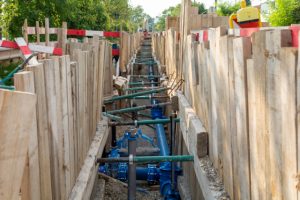
What is Underground Utility Excavation? It is also known as trenching or utility relocation. It involves the digging of tunnels to install new or replace existing utility lines, pipes, or ditches. This technique may also be used to repair damaged or broken utility lines.
What is this kind of work? Underground utility excavation takes place on soil that’s in a trench. The utility lines are typically laid underground, on streets, roads, and private residences. When trenching is used, a manhole is excavated and a trench is created where the pipes, wires, or cable will be placed. Sometimes water pipes are put into trenches.
Sometimes the trenching is done on private homes or on highways. Often utility pipes are brought into an underground reservoir. If sewer lines are being repaired or replaced, trenching is often used. Other times, trenching is used to locate piping or cable that is damaged or near the ground.
There are many different techniques for how to create these tunnels. Water is pumped through the pipes until it reaches a point where it can either be released or stored. If the water is simply released, it is known as soft water. If it is stored, it is called hard water.
When hard water comes out of the pipes, it is often referred to as black water. This is because it has a dark color from the minerals that have been dissolved in it.
How is Underground Utility Construction Used? It is very important to have a reliable source of water in most homes, especially if they are located outdoors. For this reason, it is good practice to have water stored underground in a reservoir or other storage facility. By using trenches to transport water between lines, it can be used for drinking water and to flush toilets.
Trenches can be used to carry water from one area to another. It is also possible to use these trenches to install conduits. The most common type of conduit used for this purpose is PVC. PVC is plastic that can be molded into the form of a pipe. It can also be made into various shapes depending on the needs of the project.
Water goes through pipes that are fitted underground. These pipes are very important if you want to have reliable water and electricity. Trenches allow for the pipes to run underground without being visible to passersby. This helps to ensure that the pipes are effective.
What is the Purpose of Excavation? Underground utility excavation can take many forms. Some projects simply involve excavating around the home, to create access to the basement or another area. Other projects may be more complicated. For instance, you might need to dig large trenches around a house and set up water lines to run from that area into other areas.
How is Excavation Done? Most excavation work is done on private land as well as commercial areas. Our company has the skills and years of experience in the industry to take on any size excavation project. Throughout the years, we use some of the top machines in the industry. Machines like Caterpillar excavators, Komatsu excavators, and John Deere excavators are largely used throughout the country.
Call our Portland Excavation team today at 503-461-3819 for a free-no-obligation quote for any size project you have in mind! Our service area covers Beaverton, Hillsboro, Tigard, Aloha, Lake Oswego, Milwaulkie, Gresham, Oregon City, Wilsonville, Clackamas, Happey Valley, Damascus, Forest Grove, Sherwood, and beyond.